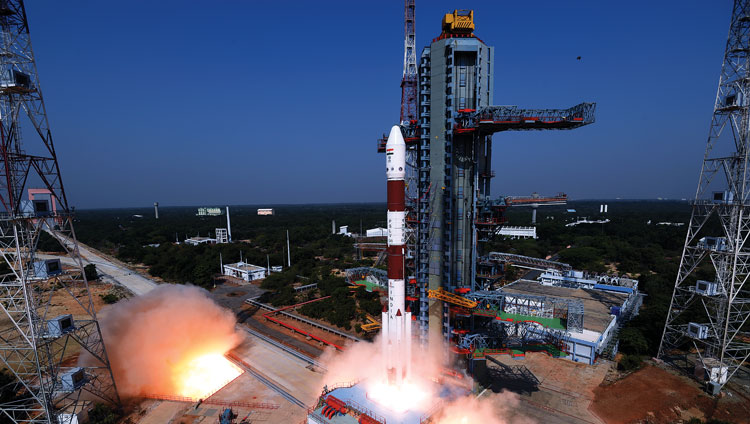INDIAN ARMED FORCES CHIEFS ON
OUR RELENTLESS AND FOCUSED PUBLISHING EFFORTS

SP Guide Publications puts forth a well compiled articulation of issues, pursuits and accomplishments of the Indian Army, over the years

I am confident that SP Guide Publications would continue to inform, inspire and influence.

My compliments to SP Guide Publications for informative and credible reportage on contemporary aerospace issues over the past six decades.
Space’s Privatisation to Launch Expansive Growth
Opening up the space sector to private companies is likely to allow better availability of resources for ISRO to carry more ambitious space exploration missions

The Space sector of India was opened up in June 2020 by the Union Cabinet led by Prime Minister Narendra Modi, enabling the participation of Indian private sector in the entire gamut of space activities, allowing private firms and startups to build satellites and rockets, besides offering space services to customers in the country and across the world. The government also shifted all operational assets of Indian Space Research Organisation (ISRO) to New Space India Ltd (NSIL), a commercial entity, and formed the Indian National Space Promotion and Authorisation Centre (IN-SPACe) as a regulator to ensure a level-playing field for the private sector.
With the creation of IN-SPACe, the reforms are aimed to provide a level playing field for private companies and start-ups. Subsequently, several ventures had submitted proposals with IN-SPACe under the Department of Space (DoS). The proposals pertain to a vast range of activities including satellite constellation, small satellite launch vehicles, ground station, geospatial services, propulsion systems and application products.
“The decision to unlock India’s potential in the Space sector has heralded a new age of public-private partnership in this sector. This marks a big change that will further strengthen India’s foray into the Space sector. Private industry and startups will be co-passengers with ISRO in this age of space research. I am hopeful that the country would soon become the manufacturing hub of space assets. The professionalism and transparency in policies as well as the decision-making process of the government will prove beneficial for the companies joining the Space sector,” said Modi in an interaction in December 2020 with key industries, startups and academia from the Space sector via video conferencing to encourage their participation in space activities.
“The decision to unlock India’s potential in the Space sector has heralded a new age of public-private partnership in this sector. This marks a big change that will further strengthen India’s foray into the Space sector,” said Prime Minister Modi
The privatisation of space sector was analysed with mixed reactions but largely garnered a welcome for being the timely transformation that the industry needed. ISRO “wholeheartedly” invited the private sector to participate in the country’s new space era through its new nodal agency, IN-SPACe.
“India is among a handful of countries with advanced space technology that can play a significant role in boosting the industrial base of the country,” said ISRO chairman K. Sivan during a press conference. According to him, even though it might take some time for the system to be formalised, the new reform will allow India to become a ‘global technology powerhouse’. However, he did suggest some policy changes for a smooth functioning and accessibility.
According to him, the new mechanism will provide fair and equitable space for private enterprises. “The role of NSIL is being recalibrated to transform its approach of a supply-driven model to being a demand-driven model for spacebased services,” Sivan added. An increased private participation in India’s space activities shall allow space-based applications and services to be accessible to everyone more widely.
IN-SPACe will have a Chairman, technical experts for space activities, safety expert, experts from academia and industries, legal and strategic experts from other departments, members from the Prime Minister’s Office (PMO) and the Ministry of External Affairs (MEA) of Government of India. IN-SPACe will work out a suitable mechanism for promotion & hand holding, sharing of technology and expertise to encourage participation of Non-Government-Private-Entities (NGPEs) in space activities. It will act as an autonomous body, under DoS, as a single window nodal agency for enabling and regulating space activities and usage of ISRO facilities by NGPEs. IN-SPACe will also permit establishment of facilities, within ISRO premises, based on safety norms and feasibility assessment. As far as ISRO is concerned, it will continue to carry out space activities including advanced R&D, interplanetary missions, human spaceflight and capacity building activities.
ISRO has done an exceptional job in conducting the missions that it has all these years, standing at par with any other global space agency but it has done so in limited resources and extremely low financial budgets especially when compared to its counterparts like the global space giant, NASA (National Aeronautics Space Agency). Even NASA is now working with SpaceX and advancing towards commercial space flights. Bringing in the private companies for the missions will expand ISRO’s resources because space exploration is not just all fancy, it is a huge financial commitment as well. The private companies providing space-based services shall also help ISRO in catering to the growing demand for space-based applications and services. The need and demand for satellite data, imageries and space technology is now multi-disciplinary, from weather to agriculture, to communication, to development, and more.
Sivan had also stated earlier that there were a few companies that were in the process of developing their own launch vehicles, the rockets like ISRO’s PSLV that carry the satellites and other payloads into space, and ISRO would like to help them do that. Right now, all launches from India happen on ISRO rockets, the different versions of PSLV and GSLV. Sivan said ISRO was ready to provide all its facilities to private players whose projects had been approved by IN-SPACe.
This would let ISRO concentrate on science, research and development (R&D), and explore interplanetary missions, human spaceflight and other larger projects like the space station. At present, ISRO is often engaged with various routine activities as well that consumes majority of its resources. So enhancing the private involvement in the space sector is a commercial as well as a strategic gain especially when more and more players from across the globe are entering the space sector.
As Sivan pointed out, the space-based economy is expected to “explode” in the coming years, in India as well as abroad, setting up NSIL and IN-SPACe amid that scenario is a majorly significant and much needed step. Sivan also noted that the space sector reform introduced by the government is going to be a “real game changer” as private sector participation in the space sector has been increasing worldwide and it is a healthy trend, as it increases diversity. In India too space sector start-ups are taking developmental activities in both launch vehicles as well as in satellites, however, there was no mechanism available in the country to extend technology and infrastructure support to them which will now be answered, he added.
ISRO will remain the core space organisation for the country with decision-making authority related to activities, missions and projects. It will focus more on (R&D), exploring new technologies, and planning new space missions. NSIL has come up as an assisting body to the ISRO to facilitate private participation in its programmes while IN-SPACe will work on the mechanism for ISRO’s engagement with industries and to meet demands of the private sector in space programmes.





